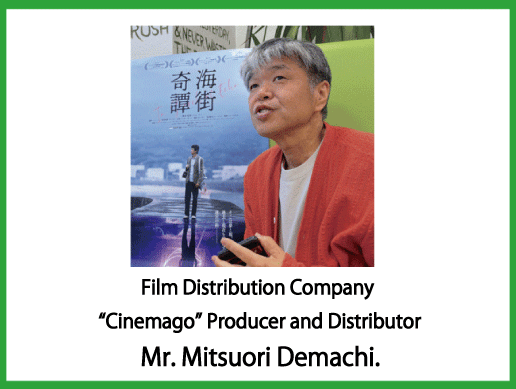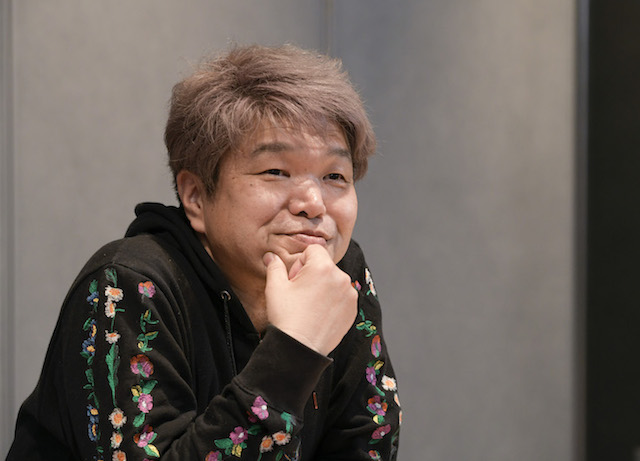



Mr. Demachi, a Virtual Office Member, has a varied background. He has worked as a Ceramic Artist, an Art Director, and was formerly the Editor-in-chief of the film review and analysis site, “Cinemarche”. He currently serves as a Distributor for the Film Distribution Company “Cinemago” and as the representative of “Yukashi Co., Ltd.”. Today, we had the opportunity to speak with the multi-talented and versatile Mr. Demachi.
GOODWORK Staff Inomata (Ms.) (hereinafter Inomata)
Thank you very much for taking the time to speak with us today despite your busy schedule.
To start off with could you please tell us what led you to become a Virtual Member of GOODWORK?
Mr. Demachi:
Around 2016, I had my first experience using facilities similar to that of GOODWORK when I gathered former colleagues from a cinema where we had worked together to pitch the idea of creating a film information website at a shared office rental room in Bakurocho, Nihonbashi. At that time, shared offices and coworking spaces were not yet widely known and used. In 2019, with the worldwide outbreak of the COVID, it prompted our company to encourage our members to work from home, using Chatwork for business communications within the company and completely transitioning regular meetings to remote calls using platforms like Zoom. However, I found that moving the company’s address and headquarters to my home made it challenging to separate work from private life. It was during that time that I discovered GOODWORK online. By becoming a Virtual Member this helped me resolve my dilemma of separating private and company life. It is also convenient because whenever it is necessary to have face-to-face meetings, I can use the meeting rooms at the discounted rates offered to members. As a side note, I also became a parishioner member of the nearby Yoyogi Hachiman Shrine (LOL).
Inomata:
So, you’ve been a member of GOODWORK since our early days. Thank you very much!
Mr. Demachi:
Allow me to digress for a moment but basically, I’m the type who always wants to get a head start on things. In middle and high school, my nickname was “Dedashi no Demachi” (Early/Fast Starter Demachi). For instance, during school marathons, I would sprint ahead with the track team at the start and take a commanding lead, only to inevitably get passed towards the end (LOL). This desire and mentality to be the “first out of the gate” hasn’t changed for me. As a kid, by being shorter and smaller than my classmates, I was determined not to fall behind making me very competitive. Observing my surroundings closely and wanting to initiate things quickly has been a constant drive for me. That’s probably why I started using shared offices early on and found GOODWORK before many others did so. Besides GOODWORK’s reasonable pricing, I also appreciate it been close to Yoyogi Park and the quieter “Ura Shibu Dori” (backstreets of Shibuya), that I find attractive.
Inomata:
Could you kindly share some details about your work and residence, as much as you’re comfortable disclosing?
Mr. Demachi:
I work in the operations department of an internet-based film information media and am involved in film distribution for theaters. As I work a lot with people in the film industry, I live along the Odakyu Line, making it convenient for me to travel to Shinjuku and Shibuya. Back in my student days, I commuted to the Nihon Eiga Gakuin (now known as Nihon Eiga Daigaku-Japan Institute of the Moving Image) located near Shin-Yurigaoka Station, so I guess I’ve always had a fondness for the Odakyu Line (LOL).
Inomata:
Could you describe your typical daily schedule?
Mr. Demachi:
Typically, I wake up between 2:00 and 3:00 AM, and before 7:00 AM, I check and respond to external emails. I also finish sending instructions to our staff using Chatwork. My routine stems from the advice given to me by my pottery master, Ryoji Koiie Sensie* (Mr.) who told me to, “Work while others are asleep”. I also have mentors like contemporary artists Shoichi Ida Sensei* (Mr.) and Tatsumi Orimoto Sensei* (Mr.), whose words of wisdom serve as spiritual guidance that I pass on to younger staff members.
*Sensei (先生) is an honorific “title” given to teachers, doctors and other professionals who have a proven track record in their field of profession.
Inomata:
Are you able to regularly take days off from work?
Mr. Demachi:
I try not to work on weekends as much as possible and instead prioritize spending time with my partner at home. You see, it’s best not to anger the “Mountain Gods”* (LOL). However, if a new film premieres in theaters starting on a weekend, it can be quite challenging to take the days off. Furthermore, I don’t work during the New Year holidays. Welcoming the Year Deity and visiting Yoyogi Hachiman Shrine for the first shrine visit of the year are more important to me as a person than work, and I value the opportunity to relax during that period. I also try to take extended breaks during seasons like cherry blossoms and autumn leaves (foliage) viewing seasons.
*Mountain Gods refers to a deity or spiritual entity in Japanese traditional beliefs that is associated with mountains, often revered as the protector of mountain, its natural environment, and sometimes even the surrounding communities (including one’s own residence).
Inomata:
Do you sometimes travel abroad for work?
Mr. Demachi:
In the past, I used to travel abroad frequently, especially during my time as a Ceramic Artist when I held annual exhibitions in South Korea. However, these opportunities have significantly reduced now that the internet allows for more remote work. Back in 1998, Japan was still thriving economically and culturally, which garnered special attention for events like the Japan-Korea exchanges I enthusiastically participated in, often collaborating with local administrations. However, around 2010, events hosted by South Korea began shifting focus towards trilateral China-Japan-Korea exchanges. It was very clear that with China emerging as an economic force the South Koreans saw this as a major business opportunity. While as a Ceramic Artist I should not have seen it in terms of winning or losing, I did feel a sense of defeat. This experience may have been one reason I eventually left the world of ceramics. “Dedashi no Demachi” (Early Starter Demachi) was able to “read the winds” I guess (LOL).
The reason I mention this is that the first overseas sales company I ever dealt with when buying foreign films was actually a Chinese company. Currently, I have dealings with two Chinese companies; an overseas sales company and a production company. Initially, this sales company had no presence in Japan, but during the Tokyo International Film Festival in 2023, I had a banquet in Shinjuku with their representative and learnt that they now have business relationships with five Japanese film distribution companies. Being the first to sign a contract with them proves I’m still “Dedashi no Demachi” (LOL).
Inomata:
I’m just a novice and not particularly knowledgeable, occasionally I watch Chinese dramas or films, and feel their scale is on a different level and quite impressive. Do you believe this to be the case?
Mr. Demachi:
Absolutely. Even young directors in China are able to work with a significantly larger production budgets compared to Japan. Back when I was a student, I sometimes served as a preliminary judge for film festivals, and until the late 2010s, there were many films from China that were difficult to watch due to their lack of quality. However, with China’s economic growth, there has been a substantial increase in investment in filmmaking resulting to a higher level of artistic expression. Investing in artists has become a status symbol for affluent individuals. This may not be particular just to China but a trend in many other countries outside of Japan. Of course, having money doesn’t guarantee a good film. Quality artistic expression is possible even with no money! (LOL).
Inomata:
Do you have the authority to decide which films to purchase after watching them?
Mr. Demachi:
Initially, we began distributing Indie Films produced in Japan with the support and assistance of other distribution companies. 2024 marks the fifth year since our establishment, which will be a crucial and pivotal year for us. We have planned releases including the Chinese film “Seafront Story” in January, the Canadian film “Come True: The Hypnosis Experiment” in February, the American film “Kick Me: Anger in Kansas” in March, and the Vietnamese film “Kfc” slated for summer. Next up might be a Malaysian film. Recently, we’ve also started acquiring Venezuelan films. There are so many films we want the people to watch (LOL).
Inomata:
Could you kindly share with us your hobbies, enjoyments, and how you like to unwind and recharge?
Mr. Demachi:
My hobby feels like work sometimes and I place great importance on “how to present (display) things”. For instance, during my time as a Ceramic Artist, I always considered how to explain the conceptual process behind my pottery, how to wrap it, and how to plan it as a product. These skills have carried over into my current role in film distribution, so you could say my work is also my passion (LOL). As for relaxation… I’d like to say “watching films”, but that would be a lie. Right now, it’s actually dieting. I make it my mission to walk 10,000 steps a day, which also helps clear my mind. I also enjoy eating delicious food as another way to unwind.
Inomata:
Do you cook?
Mr. Demachi:
Yes, I do!
I’ve been told by all my mentors that ‘those who cannot cook cannot become artists. It’s about understanding flavors, knowing how to bring out the best in ingredients, valuing meticulous preparation, and being able to extend hospitality to others. You see, even now I still consider myself to be an artist (LOL).
Inomata:
Lastly, do you have any future visions or messages you’d like to convey through your films?
Mr. Demachi:
Even though you may find a great film and want many people to watch it, there are often obstacles in promoting it, such as world events like wars which can hinder the reception of films made in certain countries or recognized at their film festivals. However, films actually have a strong historical connection with war. They have been used as media to execute wars, create justifications, and stir up the masses for mobilization. That is why Hitler was a big fan of films and used them for propaganda. Walt Disney also had a fascination with war, and during wartime, Mickey Mouse starred in cartoons that encouraged sentiments like “Defeat Japan!” Films have been continually evolving in their role of influencing and mobilizing people for their countries.
It’s not just films but also “visuals” that play a role. You might remember the CNN footage during the Gulf War that resembled video games, and left viewers deeply affected and shocked. Today, citizens are using smartphones to globally broadcast scenes from the battlefields in Ukraine, and real-time footage of conflict in Gaza is shown almost like a spectacle. There’s also the rise of information warfare through fake videos. Films and visuals are inseparable from war, serving as accessible content to understand foreign information and others’ perspectives.
Yet, films also serve as platforms and catalysts to provoke thought and discussion on critical issues such as immigration, gender, and discrimination.
Films may indeed be someone’s framed “video” of intent and information. However, my aspiration is to create a company that is sort of a “Treasure Box” that provides opportunities for broader perspectives, diversity and knowledge of unfamiliar countries and films made by multinational directors to Japanese film enthusiasts.